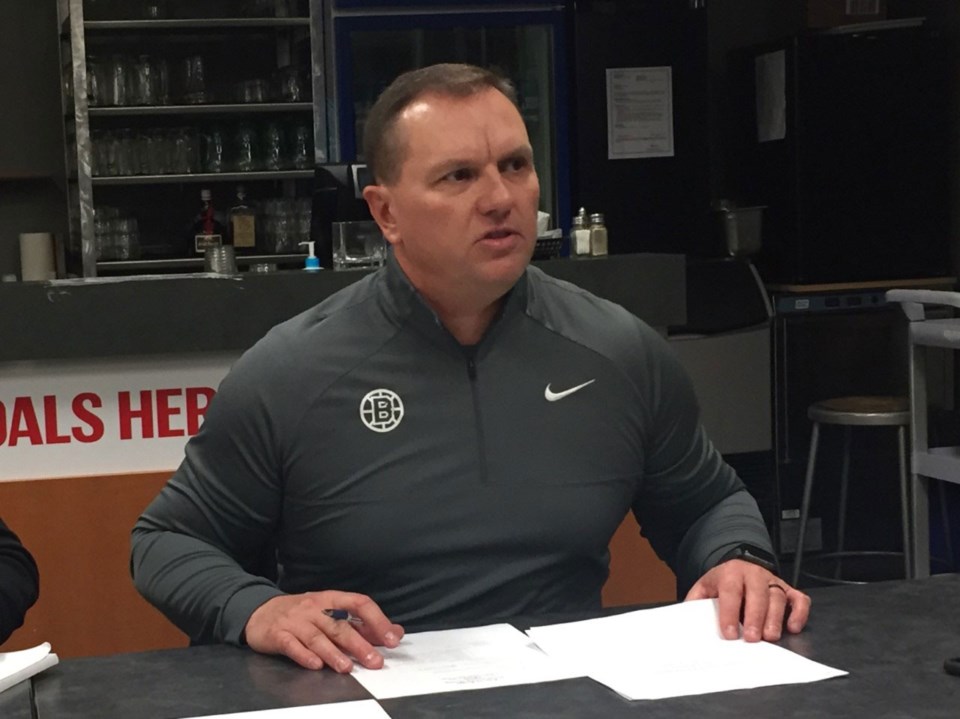The Estevan Bruins had one of their strongest seasons financially in a long time in 2018-19, according to audited financial statements released at the club’s annual general meeting on Tuesday night.
The document shows the club had $101,451 in net income for the year ending April 30, 2019, on the strength of more than $1.26 million in revenues and about $1.16 million in expenses.
The biggest reason for the fiscal success was regular season revenues, which stood at $376,383, compared to $284,649 the previous year. Season ticket revenues stood at $177,345 for 2018-19, and game day ticket admissions were at $89,173.
Revenues for the 2019 Saskatchewan Junior Hockey League playoffs were at $241,416, compared to $239,701 in 2018.
That number might be surprising to some, since the Bruins were eliminated from the playoffs in the league semi-final in 2019, whereas they were in the league final the previous year. But they actually had the same number of playoff games.
Game day post-season gate admissions were $172,764, up from $137,748.
Having a Game 7 at home for the first time in 14 years made a big difference.
“I did mention at the meeting that certainly any playoff run you have, the expenses are tied to who your opponent is and where you’re travelling to,” said team president Cory Prokop.
The club also generated $232,520 in fundraising, up from $169,389 the previous year.
The cost of sales for 2018-19 were at $824,497, up from $758,930, with regular season expenses at $561,061, playoff expenses at $99,299 and fundraising costs being $109,278.
Other expenses were at $334,412, up from $299,142. Salaries and benefits ($111,324) were their biggest expenses.
The net income will be used to continue to pay off the club’s accounts payables, which stood at $96,822 as of April 30, compared with more than $200,000 the year before.
“It’s not like we’re flush with cash or we’re rolling in the dough, so to speak. We have a lot of things to continue to keep our eyes on, and make sure we’re running the team properly, and managing our finances and watching our expenses,” Prokop said.
If not for an extended playoff run for the third straight year, Prokop believes the Bruins would have been a break-even hockey team, like most of the other teams in the league.
The Bruins have also paid off their debt to the city.
“There are a lot communities in the SJHL that struggle with their relationship with their town councils and city councils, and we’re really a model for what they’d like to be,” Prokop said.
The club has new members on the executive, with Cody Schrader and Amanda Minchin new to the board, while Greg Hoffort has shifted to a regular board member as opposed to the city’s representative. Prokop’s not sure if Hoffort will have a dual role, or if someone else will step in as the city representative.
George Sereggela, Cole Zahn and Josh Biggs round out the board.
Brian Pilloud, Brant Kersey and Amber Ganje are no long on the Bruin board.
Prokop noted that the attendance was strong for the meeting this year, with about 25-30 people present, including some fans from the community he hadn’t seen at the meeting previously.
“There were some good questions, and participation from those who were in attendance, so I was pleased,” he said.
Typically the best-attended annual meetings have been when the team has been in trouble financially or struggling on the ice, and Prokop believes the attendance might be a reflection of the excitement for the team in the community.



